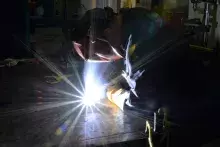
Inside a vast shop space at Kwantlen Polytechnic University’s Tech campus in Cloverdale you’ll find the school’s ultimate metalhead.
But Mike Rumpeltes isn’t trading stories about intense rock music. Instead, he’s quick to point out all the metal structures and materials in the KPU shop.
“The shop is a pretty good example. All these welding booths, cabinetry, all these things around us, this is all part of metal fabricating. Fabricators build all these things.”
Rumpeltes, a longtime KPU welding instructor, will soon be leading a class of students in metal fabrication – a Red Seal trade under the Industry Training Authority whose craftspeople create most of the metal structures in commercial and industrial environments. It’s the first time in seven years metal fabrication will be an active part of KPU’s trades training programs.
Beginning mid-February, KPU will offer a 23-week foundation program in metal fabrication. The program includes classroom instruction and shop sessions that give students the skills needed to start their careers.
Metal fabricators use a variety of tools to cut, bend and form metal to the shapes outlined in engineered drawings. Working in shop or field locations, some fabricators see projects to the end, while others focus on just one part. Basic welding skills are also part of the job, as is mathematics and the ability to operate the relevant machinery.
KPU’s metal fabrication program is returning at the right time, according to Rumpeltes, who says job opportunities in the trade are vast and varied.
Metal fabricators can work for sheet metal fabrication and welding shops, and for manufacturers of structural steel, boilers, heavy machinery and transportation equipment. They can also work in the shipbuilding and mining industries. Fabricators also build careers in fields that require more intricate metalwork, such as crafting tanks for dairy farms and breweries or working in residential and commercial construction.
Ultimately the career offers workers the satisfaction of making things built to last while making a difference in people’s lives, says Rumpeltes.
"Metal fabricators are well-rounded tradespersons with multiple skills who enjoy not only working with their hands, but also planning projects and finding solutions using creativity. They can have long careers in everything from heavy industry to high-end construction."
A challenge such industries have faced is many new workers are drawn to welding, and fewer to the lesser-known trade of metal fabrication. Besides good employment opportunities and the prospect of above-average income, Rumpeltes says the trade has real appeal. In his own career as a fabricator, Rumpeltes always took a great deal of pride in being able to take an idea or blueprint to conceptualization and, ultimately, to a finished product.
"Part of the trade's appeal is the satisfaction in taking ordinary steel and building something great and impressive. After a process of planning, cutting, bending and welding, there's beauty in every finished product."
Laura McDonald, dean of KPU's Faculty of Trades and Technology, says the university is excited to once again offer instruction in the trade.
"Our program is built to equip students with the right technical skills to succeed in the metal fabrication trade. Students will gain foundational skills that employers need in many rapidly developing industries."